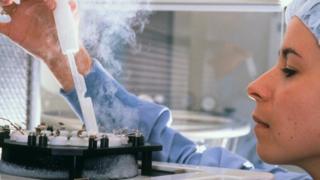 Image copyright
Image copyright
Science Photo Library
Older women are being exploited by IVF clinics “trading on hope”, the fertility watchdog has warned.
Sally Cheshire, chairwoman of the Human Fertilisation and Embryology Authority (HFEA), told the Daily Telegraph some private clinics were using “selective success rates” to target older women.
IVF is less likely to be successful as a woman gets older.
Since 2004 the number of women in their 40s undergoing fertility treatment has doubled to 10,835 in 2017.
The Telegraph said new figures showed that, among those using their own eggs, just 75 women aged 42 to 43 will end up with a baby.
For those over 44, there was a success rate of just 1% between 2004 and 2017, the paper added.
In an interview with the newspaper, Mrs Cheshire called for clinics to be “honest and transparent” with women about their chances of success.
“What the clinics shouldn’t be doing is trading on that hope,” she said.
NHS guidelines recommend that women under 40 should be offered three full cycles of IVF, while those between 40 and 42 should be offered one full cycle. However eligibility criteria varies in different areas of the country.
IVF is not usually recommended for women over the age of 42 because of low success rates.
What is In Vitro Fertilisation (IVF)?
Image copyright
Getty Images
- An egg is removed from the woman’s ovaries and fertilised with sperm in a laboratory
- The fertilised egg is then returned to the woman’s womb to develop
- IVF worked for the first time on 10 November 1977. On 25 July 1978, the world’s first IVF baby, Louise Brown, was born
- On average, IVF fails 70% of the time
- The highest success rates are for women under 35
- On average, it takes almost four-and-a-half years to conceive with IVF
Source: Human Fertilisation and Embryology Authority/Fertility Network UK
Mrs Cheshire said some parts of the sector were using “blatant” sales tactics to persuade “vulnerable” women to undergo treatment.
The 50-year-old said she had even been offered IVF treatments herself, by staff who were unaware of her role with the regulator, at a visit to a fertility show in Manchester.
“We now see things like ‘guaranteed baby or your money back’,” she said.
Add-on treatments
Mrs Cheshire also called for the watchdog to be given powers to regulate prices, saying that some private centres were charging up to £20,000 for cycles – four times as much as she said treatments should cost.
She said prices were often inflated by the growing use of “add-on treatments”, such as embryo glue and endometrial scratches, offered by clinics to boost chances of success.
Caroline’s story: ‘Am I throwing away my money?’
Caroline, 40, wishes someone had sat her down and given her a realistic cost for her IVF treatment but says that often medical staff do not know for sure.
She was originally led to believe the cost would be £5,000 but it is now at least £16,000.
“The list of treatment costs is just jargon and there are so many options. I think I needed someone to sit me down and say to me ‘this is you and this is what it will cost’,” she said.
The cost is not the only downside of IVF treatment for Caroline – the hormones have added negatively to the experience.
“I am taking some time off from treatment as I find injecting all the hormones really messes with me emotionally. The injections have bowled me over and made me completely lose it.”
Adding: “When you’re crying your eyes out at work it’s not a good look.”
However, Caroline, whose full name we are not using at her request, thinks she will continue with the treatment as she has two vials of sperm left and will likely spend another £10,000.
However, earlier this year the watchdog, which regulates all fertility services in the UK, warned that these were being offered without conclusive evidence that they increase the chance of pregnancy.
Its website now has a “traffic light” rating for such treatments. None have been given the green light, which indicates there is more than one quality trial showing the procedure is effective and safe.
Have you undergone fertility treatment? Do you feel you were persuaded to do so? Please share your experiences by emailing haveyoursay@bbc.co.uk.
You can also contact us in the following ways:
- WhatsApp: +44 7555 173285
- Tweet: @BBC_HaveYourSay
- Text an SMS or MMS to 61124 (UK) or +44 7624 800 100 (international)
Older women exploited by IVF clinics, says fertility watchdog

